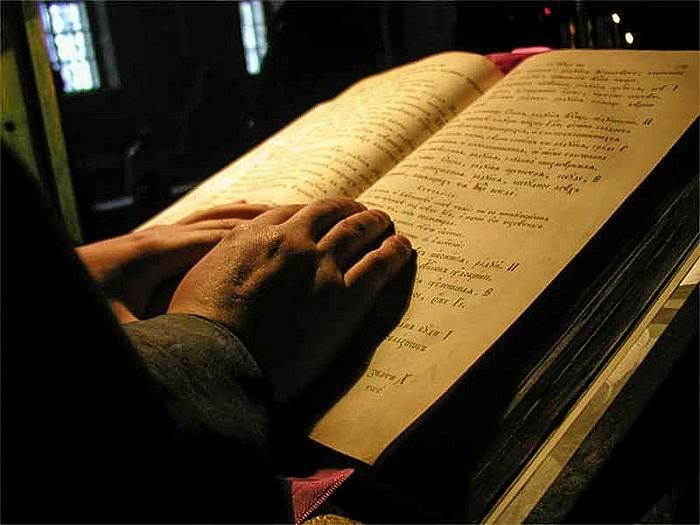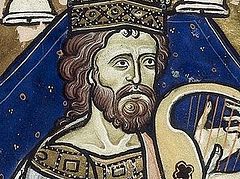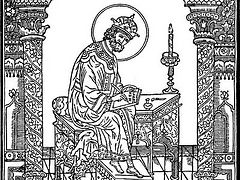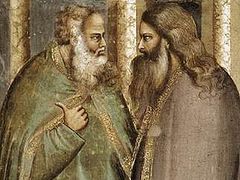Lovers of poetry are familiar with the lines from the poem of Fyodor Tyutchev[1] “Silentium”
How can a heart expression find?
How should another know your mind?
Will he discern what quickens you?
A thought once uttered is untrue.
Dimmed is the fountainhead when stirred:
Drink at the source and speak no word.
[Fyodor Tyutchev, Translation by Vladimir Nabokov[2]]
These wonderful verses of the poet-philosopher are about the birth of thought in the depths of the heart, and the difficulty of translating it into words, and the difficulty for other people to understand.
According to the Holy Hierarch Saint Gregory of Nyssa, such a phrase can thus mean:
“He who tries in words to explain the ineffable is truly lying, not out of hatred of the truth, but because of the impotence of speech.”
Most likely, the poet is referring to the pains of creativity; [the birth-pangs of creative thought if you will.—Trans]. But the question arises: if in the depths of hearts, thought is pure and true, but upon speaking, it becomes false[3] and a lie due to the impotence of speech, is the author being to categorical? After all, there are so many true books written about Truth and the Righteousness[4] [truth] of God.
We are not talking about a conscious distortion of that which a person has in his heart. Fyodor Tyutchev was serving at the College of Foreign Affairs, and he knew perfectly well the saying, widely used in diplomatic circles: “Speech was given to man to disguise his thoughts.” (Charles Maurice de Talleyrand[5]).
But this is very similar to other words—those from the Psalms of King David. According to the Psalmist, not only the thoughts and speech, but the entire man is a liar[6]. And this does not mean only some specific sinner, but rather everyone who lives on the earth (Psalm 115:2).
This Psalm 115[7] is included in the Canon for Holy Communion, and therefore, many Orthodox Christians are familiar with it:
I believed, therefore I spoke, “I am greatly afflicted.” I said in my haste [ecstasy.—Trans.], “All men are liars.” What shall I render to the Lord For all His benefits toward me? I will take up the cup of salvation, and call upon the name of the Lord. I will pay my vows to the Lord Now in the presence of all His people. Precious in the sight of the Lord Is the death of His saints.
O Lord, truly I am Your servant; I am Your servant, the son of Your maidservant; You have loosed my bonds. I will offer to You the sacrifice of thanksgiving, And will call upon the name of the Lord. I will pay my vows to the Lord Now in the presence of all His people, in the courts of the Lord’s house, In the midst of you, O Jerusalem. [Psalm 115, called Psalm 116 10-19 in most English Bibles[8]—Trans.].
Unfortunately, we do not always carefully read the words of prayers; we don’t pay attention, and we don’t understand what “Every man is a liar” means. Further down in the same psalm we read: “Precious in the sight of the Lord Is the death of His saints.” It can appear to us as a contradiction. While man lived on the earth, he was a liar and died, yet he can become a Saint. How can we clarify this apparent contradiction?
Often in a church setting, the words said are “…every man is a liar”, but the verse actually begins like this: I said in my ecstasy [9], “every man is a liar”.
Ecstasy [Исступление in Slavonic, from Ancient Greek: ἔκστᾰσις], to be outside of one’s normal self [spiritual mindset – trans], to come outside, rapture [spiritual elevation.—Trans.is the highest form of prayerful standing. Ecstasy is a special spiritual state, which is identified by the Holy Ascetics as “mental contemplation”, “spiritual vision”, “guidance [from God.—Trans. “astonishment” and “higher vision”. Ecstasy is seen in the Bible when it speaks of the visitation of a person by the Holy Spirit.
“In such spiritual rapture, the angle-like ascetic ascends to the contemplation of the Holy Trinity and the mystery of the economia of our salvation. He acquires the ability to contemplate the true essence of things inaccessible to the natural mind. He returns to the primordial (the forefather Adam) with the enlightenment and ability to behold the grace-filled light.” (St. Gregory of Sinai).
Thus it was with the prophet Moses, with the prophet David, with the holy apostle Peter, and also with the holy apostle Paul when he was in the third heaven, and heard unspeakable words.
According to the interpretation of Saint Athanasius and Basil the Great, here David’s ecstasy is called defeat and amazement, when, having reached in the spirit the mansions on high, and seen the wonderful land of the living through the Holy Spirit, he said clearly that every man in this world is lying about human blessedness, which Gregory the Theologian called false prosperity.
“Having become above man, I despised everything that was of mortal man, for ecstasy means change. When I said, I will walk pleasingly before the Lord [in the land of the living]” (Psalm 114:8[10]) and then saw that all men are liars, (because human musings are deceptive) and so I humbled myself, and exposed myself to bitter sufferings, so as to not fall from the height of my standing” (Holy Hierarch Athanasius the Great).
“David by the Holy Spirit contemplated the fallen human nature and found it to be false.”
If we generalize the thoughts of the Holy Fathers, David by the Holy Spirit contemplated the fallen human nature of the decedents of Adam—the ancient and primal man. And he saw that human thoughts, spoken words, deeds, hearts, mind, reason, and understanding, are all false.
But what about King David himself? We read about this in the writings of Basil the Great:
“The Prophet [David] does not contradict himself here, as some sophists try to accuse him, arguing that if every man is a liar; and if David is also a man, then he himself would also be a liar. And if he is a liar, then it is not necessary to believe in what he says. But the truth is rather as we say. The people referred to here [as being liars] are those who are still possessed by human passions.
“To the contrary, those who have already been elevated above carnal passions by the perfection of the mind, have passed into a state like the angels, and thus, when talking about the affairs of men, it is obvious that he [David, a Holy Person, one in ecstasy.—Trans.] excludes himself from among those other [false] people.
It is clear that if there is an exception here for the Prophet David, then we should try to take advantage of this, and to learn the conditions for such an exception.
In the opinion of the Holy Hierarch Gregory Palamas, ecstasy in a broad sense, “is distance from the mundane and carnal wisdom…” In other words, ecstasy is:
“unceasing mental prayer, in which the human mind possesses a constant memory of God, freedom from all attachments to passions and what we call the ‘world of sin’.” (Metropolitan Hierotheos Vlachos)
But in order to be removed from yourself, you must first know yourself, in order to know what you need to be removed from. And according to the Holy Fathers “a man is one who knows himself” (Venerable Pimen the Great).
“The one who knows himself is given the knowledge of everything; and he who is obedient to God obeys everything, when humility reigns in his members” (Hieromartyr Petros of Damascus).
“Whoever can know the dignity of his soul can thus know the power and mysteries of the Godhead” (St. Macarius of Egypt).
“As the one who knows himself knows all, so also the one who does not know himself does not know anything else” (Holy Hierarch John Chrysostom).
“When you know yourself, then you can know God, as befits it to view with the mind of a creature” (Venerable Nilus of Sinai).
“It is necessary for a person who wants to become a partaker of the Heavenly Light to know himself.” (Venerable Nikodim of the Holy Mountain)
“Whoever knew the infirmity of the essence of man received experiential knowledge of God’s helping power.” (Venerable Maxim the Confessor)
He who knows himself sees that he has within himself a hidden person of the heart (1 Peter 3:4), called in Scripture: the child of God (John 1:12), son of light (Luke 16:8), born again (John 3:3), “revived from the dead”, “heavily” (1 Corinthians 15:47-49), “[an] inner man” (2 Corinthians 4:16), “spiritual” (Ephesians 4:21), “a new creation” (2 Corinthians 5:17).
But where does knowledge of oneself begin? According to Bishop Innocent of Kherson, “It is good if someone considers himself to be bad, because it is only then that he begins to become good.” This is the beginning, these are your first steps; at the height of these may be the thoughts of Silouan of Athos:
“We can only reason as much as we have known the Grace of the Holy Spirit”, “No one speaks about perfection from themselves; they only speak about what the Spirit gives them.”
Or, according to the Apostle Paul, Divine Power works in the born again man, “both to will, and to do for His good pleasure.” (Philippians 2:13)
On this occasion, we can give an example from the life of the Venerable Silouan of Athos, in his book “Elder Silouan” by Archimandrite Sophrony (Sakharov):
“In 1932, a monastery was visited by a Catholic doctor, Father Khr. B. He spoke a lot with O.V. about various questions of the life of the Holy Mountain, and among other things, he asked:
“Which books do your monks read?”
“John of the Ladder (Climacus), Abba Dorotheus of Gaza, Theodore the Studite, John Cassian the Roman, Ephraim the Syrian, Barsanuphius and John, Macarius the Great, Isaac the Syrian, Symeon the New Theologian, Nicetas Stethatos, Gregory of Sinai, Gregory Palamas, Maximos the Confessor, Hesichia, Diadochos, Nilus and other fathers, contained in the Philokalia,” answered O.V.
“Your monks are reading these books! Among us only professors read them!” the doctor said not hiding his surprise.
“These are the basic books of each of our monks,” O.V. answered. “They also read other works of the Holy Fathers of the Church, and the writings of the later ascetic writers, such as Bishop Ignatius (Bryanchaninov), Bishop Theophan the Recluse, the Venerable Nilus Sorsky, Paisios (Velichkovsky), John of Kronstadt, and others.”
O.V. told Elder Silouan, who he deeply esteemed, about this conversation. The Elder remarked: “You could tell the doctor that our monks not only read these books, but they themselves could write books akin to them! Monks do not write because there are already such wonderful books, and they are greatly pleased by them. But if for some reason these books disappeared, then the monks could write new ones.”
This means that even in our time, there exist such ascetics, who have both the right thought, and an incarnate word, just like the ancient great Saints. For it is said: Falsehood is the old man, but Truth—this is the new man (Ancient Patericon[11]).
And in this case, the “spiritual man” will say “My heart is overflowing with a good theme;[12]” (Psalm 44:2)[13] and My tongue is the pen of a ready writer.[14] (Psalm 44:2). Because he is faithful to his Lord, who said: He who believes in Me, as the Scripture has said, out of his heart will flow rivers of living water (John 7:38).
The womb is a heart with ineffible thoughts, and living water is grace with incarnate words and deeds (Holy Hierarch John Chrysostom).
Ecstasy, as we have already noted, is change—a change of mind, or in Ancient Greek: μετάνοια [metanoia.—Trans.] Changing our lives, enlightening our minds, purifying our hearts, fulfilling the commandments, communing from the Chalice of the Body and Blood of Christ, from one precious vessel to another no less precious vessel;
We force ourselves, struggling and trying to imitate the Holy Ascetics, who were vouchsafed to hear from the Lord Jesus Christ during life: “Behold, an Israelite indeed, in whom is no guile! [lies, falsehood.—Trans.[15]]” (John 1:47) and after their death: “Precious in the sight of the Lord Is the death of His saints.”[16] (Psalm 115:6). Amen!
---






